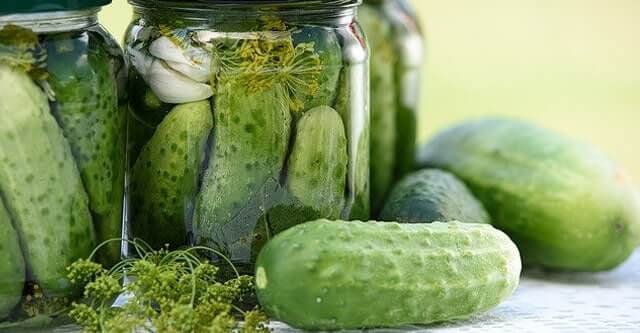Last Updated on January 31, 2021 by Dr Sharon Baisil MD
Diabetes is a health ailment that affects a good amount of the population. It is a very prevalent problem among children, adults, as well as aged people.
There are various restrictions on eating and food habits imposed on one’s lifestyle when it comes to managing diabetic health. It is important to abide by all the norms and rules to ensure safety.
But these rules often tend to confuse us. What to eat and what not to? How do certain foods affect blood sugar levels? And endless such questions.
Today we will talk about a very common and savored side dish – pickles and olives. We will tell us …
- Can diabetics eat pickles and olives?
- What are its nutritional values?
- What are the benefits of eating pickles and olives?
- Are there any side effects?
So without wasting more time, let us delve right into today’s topic.
Can Diabetics eat pickles and olives?

To give you a direct answer – YES! Pickles and olives are both safe for a diabetic patient. They are rather recommended and even help to keep blood sugar levels under control when properly used.
Pickles, which are usually pickled cucumber and olives, are great delicious additions to make a boring meal more flavorful. It is often enjoyed by diabetics who are on a strict and restricted diet.
Fortunately, pickles and olives pose hardly any health complications. And thus, they can be enjoyed as a side to a diabetic diet plan.
Pickles are good for a diabetic as they are made out of ingredients that are safe for diabetic consumption in the first place.
Cucumbers are generally the most popularly used item to make pickles. They are very safe and such food items that can reduce the diabetic effects on the body.
Moreover, even olives have various health advantages and are useful to control diabetes. Olives are great additions to the meal to make it safer and more nutritious.
Olive is safe and recommended, and therefore, olive oils are also safe and deemed good for diabetes management.
In addition to that, pickles and olives are overall low in carbohydrates. Carbohydrates and calories are the major elements that give rise to an imbalance of blood sugar levels. Hence, the body’s glucose levels are not affected due to the consumption of pickles and olives.
They add nutrition and taste to a rather bland and sometimes boring diabetic meal. We will discuss the nutritional information of pickles and olives later in this article.
Moreover, the Glycemic Index of pickles and olives also proves that they can be added to a diabetic meal safely without harming the blood sugar levels. Let us have a look at their Glycemic counts.
What is the Glycemic Index for pickles and olives?

The measure of carbohydrates and their eventual effects on one’s blood sugar levels is a very important marker to determine what foods are best for a diabetic individual.
It is often with the Glycemic Index of food that one can determine this level of safety.
Foods are ranked on a 1 to 100 scale based on their sugar content. They are then categorized into the following categories:
| Sl. No. | Glycemic Index categories | Glycemic Index ranges |
| 1. | Low Glycemic Index (safe for diabetics) | 0 to 55 |
| 2. | Medium Glycemic Index (safe if taken in controlled quantities) | 55 to 69 |
| 3. | High Glycemic Index (unsafe for diabetics) | From 70 and above |
According to the table, we can easily say that pickles and olives fall under a safe glycemic index classification. They are extremely low in Glycemic Index; that is, their GI falls between 0 and 55.
The Glycemic Index of Olives is 0. It does not have enough carbohydrate to affect the body’s blood sugars.
On top of that, the Glycemic Index of pickles generally is 32. This is also a low margin and very safe for diabetic individuals.
Thus, it is proved that pickles and olive do not raise blood sugar. They would rather make a meal healthier by balancing the total carbohydrates and adding other minerals and vitamins.
Let us move onto discussing the various nutrients found in these supplements. This will help us to know the benefits of pickles and olives on our health better.
What is the Nutritional composition of Pickles and Olives?

We talked about how Pickles and Olives are helpful to the body, metabolism, and blood sugar levels. It is important to know the nutritional basis of food to determine its good effects on health.
Following are two separate tables showing the variety and amounts of nutrients found in pickles and olives.
Pickles:
| Sl. No. | Nutrients available in 100 g of pickles | Amount available |
| 1. | Calories | 11 |
| 2. | Carbohydrates – Dietary fiber – Sugar | 2 g – 2 g – 2 g |
| 3. | Protein | 0.33 g |
| 4. | Fats | 0.2 g |
| 5. | Water | 94.0 g |
| 6. | Sodium | 1208 mg |
| 7. | Copper | 0.085 mg |
| 8. | Iron | 0.4 mg |
| 9. | Manganese | 0.011 mg |
| 10. | Phosphorus | 14 mg |
| 11. | Magnesium | 4 mg |
| 12. | Choline | 3.6 mg |
| 13. | Potassium | 23 mg |
| 14. | Zinc | 0.02 mg |
| 15. | Vitamin A | 191 µg |
| 16. | Vitamin C | One µg |
| 17. | Vitamin K | 47 µg |
| 18. | Vitamin E | 0.09 µg |
| 19. | Folate | 0.09 µg |
| 20. | Vitamin B6 | 0.009 µg |
| 21. | Vitamin B5 | 0.038 µg |
| 22. | Vitamin B2 | 0.01 µg |
Olives:

| Sl. No. | Nutrients available in 100 g of olives | Amount available |
| 1. | Calories | 115 |
| 2. | Carbohydrates – Dietary fiber – Sugar | 6 g – 3 g – 0 g |
| 3. | Proteins | 0.84 g |
| 4. | Fats | 10.68 g |
| 5. | Water | 79.99 g |
| 6. | Sodium | 735 mg |
| 7. | Iron | 3.3 mg |
| 8. | Calcium | 88 mg |
| 9. | Copper | 0.251 mg |
| 10. | Manganese | 0.02 mg |
| 11. | Selenium | 0.9 mg |
| 12. | Zinc | 0.22 mg |
| 13. | choline | 10.3 mg |
| 14. | Magnesium | 4 mg |
| 15. | Phosphorus | 3 mg |
| 16. | Potassium | 8 mg |
| 17. | Vitamin A | 403 |
| 18. | Vitamin E | 1.65 |
| 19. | Vitamin C | 0.9 |
| 20. | Vitamin K | 1.4 |
| 21. | Vitamin B6 | 0.009 |
| 22. | Vitamin B3 | 0.037 |
| 23. | Vitamin B1 | 0.003 |
| 24. | Vitamin B5 | 0.015 |
Therefore, now we also know what the various macro and micronutrients found in pickles and olives are.
Let us move on to know the benefits that these nutrients have on our health.
Benefits of eating pickles and olives

Listed below are some of the many health benefits of consuming pickles and olives.
- Pickles, as we discussed earlier, are already fermented. This increases its richness in probiotics, as known as good bacteria. They are good for the gut and, in turn, encourage better digestion and well-maintained and safe gut health.
- The juice of the pickle, which is all vinegar, is very good for the health. It can assist in keeping the blood sugar elves under control and diabetic patients out of risk.
- Both pickles and olives are rich in antioxidants such as carotene that is very helpful to health. It is necessary to safeguard the body from diseases.
- Vitamin C found in Olives and Pickles has proven to boost immunity and protect the body from infections.
- Pickle, especially its juice, is good for the muscles; it reduces cramps and strengthens the overall muscular system.
- Olives are also good and safe for weight loss, tackling obesity, managing heart health, and cholesterol issues.
Some side-effects of olives and pickles
There are certain essential things to keep in mind and abide by.
As you may have observed in the nutrition tables, both pickles and olives are very rich in sodium. One whole serving of a pickled cucumber can contribute to a higher amount of sodium in the body.
Extreme sodium levels are not recommended. Sodium is responsible for the increase in the body’s blood pressure.
Too much sodium can be harmful to the blood pressure and thus cause heart-related troubles.
Diabetics are at a greater risk because they are more vulnerable to developing heart diseases.
Thus, it is necessary to watch your portions and include these foods in fewer quantities for safety.
What are the uses of pickles and olives?
Pickles and olives are sour, salty, and savory dishes that are enjoyed on the side with the main meal. They are paired with many things, and they enhance the flavors of everything they are added to.
They are available in a myriad of varieties and are versatile, just like their options. Pickles can be found in all places, any stores, and they can also be prepared at homes.
Olives are among the major topping ingredients in pasta, salads, pizzas, sandwiches, etc. pickles can be used in burgers, curries, rice, and munched on salty and sour snacks.
Pickles and olives are famous all over the world and are used in various cuisines too. They are also immensely popular for their ability to enrich one with several nutrients. Thus, it has the goodness of taste as well as health.
Pickles are usually salted and softened veggies such as cucumbers and carrots that are soaked in vinegar and spices and permitted to ferment for a time until slightly pungent. They have strong flavors and also a tangy touch that adds sourness to the other meals.
The breaking down of pickles during the fermentation process helps to make it easier on the digestive system. They are useful as they promote many gut bacteria’s better functioning and lead to an encouraging metabolism.
References
- https://www.webmd.com/food-recipes/health-benefits-pickles
- https://pubmed.ncbi.nlm.nih.gov/30146932/
- https://pubmed.ncbi.nlm.nih.gov/28883903/
- https://pubmed.ncbi.nlm.nih.gov/29194424/
- https://pubmed.ncbi.nlm.nih.gov/29993262/
- https://pubmed.ncbi.nlm.nih.gov/30002281/
- https://pubmed.ncbi.nlm.nih.gov/31803464/
- https://pubmed.ncbi.nlm.nih.gov/31958295/
- https://pubmed.ncbi.nlm.nih.gov/32485082/
- https://pubmed.ncbi.nlm.nih.gov/33116041/
- https://pubmed.ncbi.nlm.nih.gov/25876570/






This article would be enhanced by discussing fermented pickles which must be refrigerated versus those made with vinegar. It is the former which provides the probiotic benefits. That’s a very important distinction.